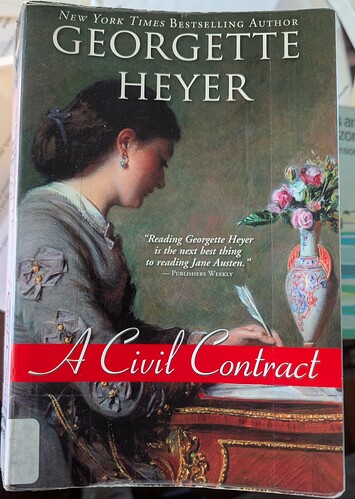I enjoyed Persuasion through most of the book but do agree with others that Captain Wentworth was not given a fully developed character. The short relationship almost seems one of propinquity; they certainly had a lot of characteristics to work with though!
He was, at that time, a remarkably fine young man, with a great deal of intelligence, spirit and brilliancy; and Anne an extremely pretty girl, with gentleness, modesty, taste, and feeling. - Half the sum of attraction, on either side, might have been enough, for he had nothing to do, and she had hardly any body to love.
We live with Anne throughout the book and understand why she would be lovable, but not really much of Frederick. Her empty life can explain why she clings to the memory of love. But they don’t really build that up again so I do have some trouble understanding why Frederick rekindled his feeling love so easily. Well, not easily per se, but without much to go on until near the end.
There are a lot of similarities to P&P - the surprise letter, the Lady Catherine de Bourgh equivalent, etc. But I do not see similarities between Mary and Mrs. Bennet, other than the invalidism. Mrs. Bennet was silly but very much loved her daughters and her every move was designed to ensure their futures. To some extent, Mr. Bennet was no better than Sir William in letting his personal pleasures preclude proper preparation. Mary Elliott Musgrove was totally self centered and cared little for her sons. It must have been hard, though, to know that she was her husband’s second choice after her sister.
I enjoyed all the character developments and locales up until about the last quarter of the book. Then seemingly out of the blue is a 15 page exposition of the wicked Mr. Elliott. All Anne had was a vague unsubstantiated feeling that something was not right about him. Then Mrs. Smith lets it all out in one long dissertation including letters. As I was reading that section I was thinking show, don’t tell. It took me out of the flow of the narrative.
I also did not see Frederick suffering under the impact of the love bomb hitting him enough to write that note. Their clarifying walk was covered in one page! And then some history of how he almost accidentally got engaged to Louisa!
The last thing that bothered me about the book (that I really did like) was where Anne says that she was correct to be persuaded by Mrs. Russell to give up Frederick eight years prior, but that Mrs. Russell erred in giving that advice. Seems like kind of an easy out - not my fault, my sense of duty gives me nothing which which to reproach myself. Even though it was the wrong decision. Not to mention Mrs. Russell encouraging Anne to Mr. Elliott - along with almost everyone else! Let’s blame it all on Mrs. Russell! Love this quote,
There was nothing less for Mrs. Russell to do, than to admit she had been pretty completely wrong, and to take up a new set of opinions and hopes.
Oh - have we all forgotten poor Mrs. Clay, whose only crime was befriending the daughter of a widower and trying to finagle him into a marriage? Then being seduced by a scoundrel?





